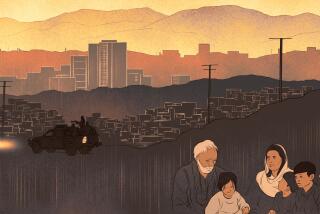A Marine Speaks Their Language
- Share via
KANDAHAR, Afghanistan — For the first time in 12 years, the United States has an official face in the capital, Kabul, where the American Embassy reopened this week.
But here in Afghanistan’s second-largest city, the spiritual and political base of the deposed Taliban, the face of the U.S. is Marine Corps Lance Cpl. Ajmal Achekzai.
Part of the Camp Pendleton-based 15th Marine Expeditionary Unit, the 26-year-old who was born in Kabul is doing double duty: educating Marines about Afghanistan and its people, and showing a friendly and familiar-looking face to the locals.
“I felt it right away: These are my people,” Achekzai said. “I’ve never been [in Kandahar], but I felt at home. In my family, you’re taught: Never forget your religion [Islam] or where you’re from.”
Twenty years ago, Achekzai’s family fled after the Soviet invasion. His father was a prominent political scientist, a sure target. His mother was from the Kandahar region, an agricultural area where grapes once flourished in irrigated fields. The family found sanctuary in the Hayward-Fremont area of Northern California, in a neighborhood known as Little Afghanistan. They later moved to Salt Lake City.
After arriving at Camp Rhino, the desert outpost the Marines established Nov. 26, Achekzai was among the first troops to move in and secure Kandahar’s deserted airport, now being used for military cargo planes and humanitarian aid shipments.
One of a handful of Marines who speak Pashto and other Afghan dialects, Achekzai has become a local hero as he greets laborers at the gate to the airport and occasionally moves through the city to buy supplies.
“I was shocked at what I saw,” Achekzai said. “Old people and little kids barefoot in the cold and me all warm in my gear. I wished I could give them my stuff, but I knew I couldn’t.”
On Achekzai’s trips into town, the impact is startling when he converses in the local dialect.
“They say, ‘Wow, you’re one of us,’ ” he said. On one trip, he stumbled across someone he believes is a distant relative.
To the Afghans, Achekzai’s message is simple: The Marines are here to help, and then they will leave. These war-weary people are suspicious of all foreigners, even those who helped topple the Taliban.
“Most of the people, maybe 80%, are happy the Marines are here,” he said. “Others are stunned. They don’t know what to think. Then there are 2% or 3% that don’t like anybody from the outside.”
Even as the Marine buildup continues at the devastated Kandahar International Airport, the official line is that the Marines will soon depart.
“We are not an occupation force,” said Marine Corps spokesman Maj. Chris Hughes. “The Marines are here to do a job and leave. We want to help these people get started rebuilding their country.”
Part of that effort includes hiring local men to help rebuild the airport. This was once a regional hub for air traffic, but now it is a war-torn wreck with bomb craters on the runway and burned-out rocket launchers in the withered rose garden.
“Life was very hard” under the Taliban, said Malek Nabeezada, one of the laborers working at the airport. “They shaved the heads of our young, they beat them and put many people in prison.”
Mohammed Siddq, an engineer helping restore water and sewage services at the airport, shared a joke with Achekzai as his crew, watched by reporters and Marines, began their work.
“He told me, ‘Welcome home,’ ” Achekzai said.
Like many Marines, Achekzai is eager to return to the United States. But he has an extra reason: His bid for U.S. citizenship should become final a few weeks after he returns.
More to Read
Sign up for Essential California
The most important California stories and recommendations in your inbox every morning.
You may occasionally receive promotional content from the Los Angeles Times.












